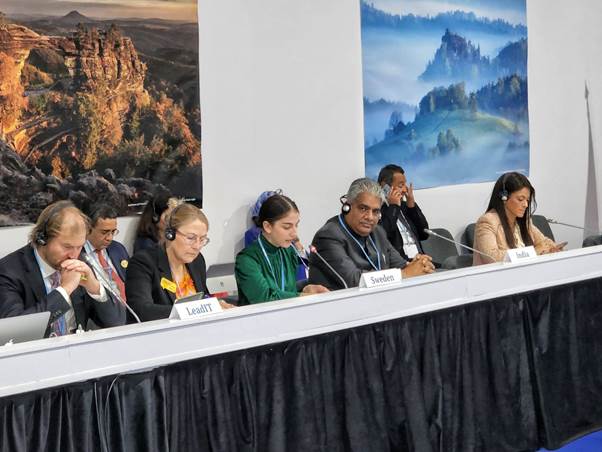PM Narendra Modi is set to launch a green credits initiative, aimed at encouraging the establishment of plantations, during his two-day visit to the United Nations climate conference being held in the United Arab Emirates.
The Prime Minister, who is expected to deliver his address at the opening session of the World Climate Action Summit, will also launch another climate initiative aimed at industries, foreign secretary Vinay Mohan Kwatra said at a press briefing on Thursday.
The 28th Conference of the Parties (COP28), held under the United Nations Framework Convention on Climate Change (UNFCCC), is being held in Dubai from 30 November to 12 December.
Explainer: What are Green Credit Initiative and LeadIT 2.0 events that India will co-host during COP28?
During the course of the COP28 being held in Dubai, India will co-host two high-level side events on the themes of ‘Green Credit Initiative’ and ‘LeadIT 2.0’. ETV Bharat’s Aroonim Bhuyan explores why these issues are important in the global fight against climate change.

Prime Minister Narendra Modi, who will be at the conference on the first two days, will deliver a national statement highlighting India’s climate actions.
“Besides his address to the COP28, the Prime Minister will also be participating in three high-level side events, of which two are being co-hosted by India,” said Kwatra. “The first high-level event, which is being co-hosted by India and the UAE, is the launch of Green Credits Initiative.”
The Prime Minister will also launch another initiative called LeadIT 2.0, which the foreign secretary explained as a ‘Leadership Group for Industry Transition’, at an event co-hosted by India and Sweden.
PM Narendra Modi will also be participating in another high-level event, titled Transforming Climate Finance, which is to be hosted by the Presidency of the COP28, Kwatra said.
The Prime Minister had previously attended the COP21 conference in Paris in 2015, and the COP26 conference in Glasgow in 2021.
What is the PM Narendra Modi to be launched Green Credits Initiative?
To take ahead the ‘LiFE’ – ‘Lifestyle for Environment’ movement announced by the respected Prime Minister Narendra Modi in 2021, the Ministry of Environment, Forest and Climate Change has introduced two pioneering initiatives that indicate the country’s pro-active approach to climate change, sustainability and promotion eco-conscious practices.
These initiatives, the Green Credit Program (GCP) and the Ecomark Scheme, seek to encourage environmentally friendly practices rooted in tradition and conservation; reflecting the ideas of LiFE concept.
Green Credit Program (GCP )notified on 13th October, 2023 is an innovative market-based mechanism designed to incentivize voluntary environmental actions across diverse sectors, by various stakeholders like individuals, communities, private sector industries, and companies.
In its initial phase, the GCP focuses on two key activities: water conservation and afforestation. Draft methodologies for awarding Green Credits have been developed and will be notified for stakeholder consultation.
These methodologies set benchmarks for each activity/process, to ensure environmental impact and fungibility across sectors. A user-friendly digital platform will streamline the processes for registration of projects, its verification, and issuance of Green Credits.
The Green Credit Registry and trading platform, being developed by ICFRE along with experts, would facilitate the registration and thereafter, the buying and selling of Green Credits.
What is the LeadIT 2.0 (Leadership Group for Industry Transition) mission which is next on the cards for PM Narendra Modi after Green Credits Initiative?
The LeadIT initiative lays specific focus on hard to abate sectors that are key stakeholders in the global climate action and require specific interventions. It gathers countries and companies that are committed to action to achieve the Paris Agreement.
It was launched by the governments of Sweden and India at the UN Climate Action Summit in 2019 and is supported by the World Economic Forum. LeadIT members subscribe to the notion that energy-intensive industries can and must progress on low-carbon pathways, aiming to achieve net-zero carbon emission by 2050.
“The low carbon transition of the industrial sector will not only contribute towards the reduction in required greenhouse gas emissions. It has several co-benefits that include increasing resilience to changes in climate, enhanced energy security, innovation, socio-economic development and job creation”, Shri Bhupender Yadav, Union Minister.

He also highlighted that the current phase of LeadIT is set to conclude in 2023 and the next year is the time to reflect on the performance and achievements so far. Also, the post-2023 process needs to be deliberated on to identify the priorities in a consultative manner.













